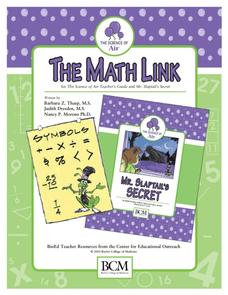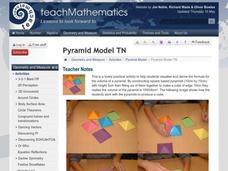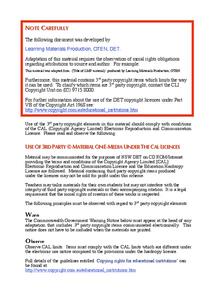Baylor College
They're Everywhere: Bacteria
Totally gross out your class with the eighth lesson in this series on food science. Explore the microscopic world of bacteria by taking swabs of different classroom objects and growing colonies in petri dishes. An engaging activity that...
Baylor College
What's That Food?
Get things cooking with the first lesson in this series on the science of food. Working in small groups, young scientists make and record observations about different mystery foods. These descriptions are then shared with the class and...
Baylor College
Healthy Snacks
Assess your pupils' ability to identify healthy food choices in the final lesson of this series on food science. Given five different food labels, young nutritionists will rank them from most to least healthy, supporting their choices...
Baylor College
Needs of Living Things: Post-Assessment
Assess your class's knowledge of the needs of living things with the final lesson in a series. Given a large piece of paper and coloring utensils, young scientists draw a picture of themselves and a plant or animal of their choosing,...
Baylor College
A Place to Be
Home sweet home. Humans, birds, beavers, ants, we all need a place place to rest and keep us safe. In the ninth lesson of this series, the importance of shelter is discussed as the teacher reads aloud the book Tillena Lou's Day in the...
Baylor College
Healthy Homes
Meant to follow a lesson about how concentrated air particles can be inside of a building, this resource gets individuals to assess the possible air pollutants in their own homes. They take home a worksheet and circle spots on it that...
Baylor College
Food: The Math Link
Enrich your study of food science with with these math worksheets. They offer a variety of food-related word problems that are great practice for multiplying, identifying fractions, estimating length, and performing calculations...
Baylor College
What is Air? Pre-Assessment
First, estimate existing knowledge about air with a class discussion. Then, hand out a 10-question pre-assessment quiz to record how much pupils know to compare to their knowledge later. This will also give mini meteorologists the...
Baylor College
Global Atmospheric Change: The Math Link
Change up the classroom atmosphere with this interdisciplinary resource. Following along with the children's book Mr. Slaptail's Curious Contraption, these math worksheets provide practice with a wide range of topics including...
Baylor College
Air: The Math Link
Inflate this unit on the science of air with these math skills practice and word problems. Accompanying the children's story Mr. Slaptail's Secret, this resource covers a wide range of math topics including the four basic...
Curated OER
Epic Improvisation
Really? Rapping The Odyssey? Really. A discussion of the oral tradition of story telling and its links to Epic poetry sets the stage for a series of activities that encourage improvisation to integrate music into other classrooms....
Jim Noble, Richard Wade & Oliver Bowles
Pyramid Model
Seeking to derive the formula for the volume of a square pyramid, geometry learners construct six square based pyramids that, when pieced together properly, form a cube. Two short videos demonstrate the relationship...
Curated OER
SAMR Model: Search
Based on the SAMR model, use this rubric to find specific examples of how to consider your students' abilities to search and collect information using technology. The resource illustrates how learners evolve from...
Mathematics Vision Project
Module 1: Getting Ready Module
This fabulous resource is a must-have for any algebra teacher's arsenal of lessons. Developing the idea of equations and use of variables from basic physical scenarios, learners gain valuable intuition in the structure and meaning of...
Novelinks
The Giver: Vocabulary Bingo!
Bingo! Combine the thrill of bingo with Lois Lowry's The Giver in a fun vocabulary lesson. Kids write selected vocabulary words from the novel onto a bingo chart, and then listen for the correct definitions in order to mark off...
BW Walch
Creating and Graphing Linear Equations in Two Variables
This detailed presentation starts with a review of using key components to graph a line. It then quickly moves into new territory of taking these important parts and teasing them out of a word problem. Special care is...
Library of Congress
Determining Point of View: Paul Revere and the Boston Massacre
If you're teaching point of view, this is the lesson for you! First, decipher the writer's point of view from a primary resource, then compare and contrast the primary source with a secondary source to explore the Paul Revere's...
Novelinks
The Little Prince: Blooms’ Taxonomy Questions
Question what you read with a lesson based on Bloom's Taxonomy. As kids read The Little Prince by Antoine de Saint-Exupéry, they formulate questions with cues from a graphic organizer, and answer them to work on critical...
Council for the Curriculum, Examinations and Assessment
Health and the Whole Person
The first lesson of the unit introduces class members to the social, physical, emotional, cognitive, and spiritual constituent elements of health and the need for balance among these elements. Class members used the provided assessment...
Olomana School
Mixtures and Solutions: Paper Chromatography Experiment
Why does some ink bleed through paper, and other ink doesn't? Practice some paper chromatography to separate the colors from a pen with an interactive experiment for middle and high schoolers. Learners use a variety of solutions to track...
Curated OER
Compare and Contrast Versions of a Story
Compare and contrast reading passages with the ever favorite story of Cinderella. The versions in focus include an Italian version and a Native American story followed by three questions designed to share similarities and...
Millennium Schools
Lifestyle Chemistry
My name is Bond, Hydrogen Bond. Written for distance scholars working on chemistry at the high school level, the lesson includes eight weeks worth of material divided into six parts: substances you use, mixing it up, your skin, what's...
Virginia Department of Education
Chemical Bonds
How are chemical bonds similar and how are they different? Provide your young chemists with the resources to more thoroughly understand the concepts of ionic and covalent bonds. Pupils research these topics, diagram examples of each...
Cornell University
Scaling Down: Effects of Size on Behavior
Two activities explore the concept of size, especially small sizes down to the nano. Scholars practice determining volume, mass, and density and calculate exponential increases and decreases. They then predict and test the effect of size...

























